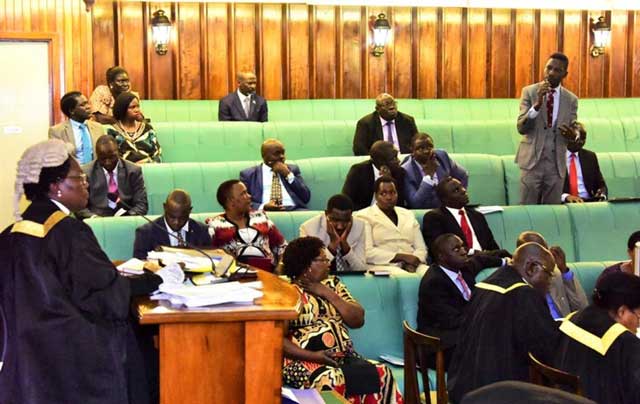
Kampala, Uganda | THE INDEPENDENT | Parliament has resolved to exempt the Islamic Development Bank and a number of agricultural implements from taxes. Parliament resolved this on Wednesday during debate on the Value Added Tax (Amendment) Bill, 2020. The Legislators scrapped VAT on combine harvester, agricultural trailers, tractor mounted Hay mowers, slashers, rakes & tedders, crop sprayers and Irrigation equipment among others.
The committee arrived at the tax exemptions following the adoption of a report from the Finance Committee of parliament, which first discussed the bill. The bill, which was tabled by the Finance Ministry, sought to amend Cap.349 of the Value Added Tax- VAT Act to restrict a taxable person from claiming input tax credit in respect of construction of a commercial building, exempt the Islamic Development Bank from tax, to require an owner of a commercial building to account for tax for each building separately and to provide for exemptions from tax for specified supplies.
However, after the adoption of the Committee report, MPs resolved that a manufacturer will now be allowed to claim for input VAT incurred not more than twelve months prior to him or her being registered for VAT. According to Finance Committee Chairperson, Henry Musasizi, the new amendment will increase the period for, which manufacturers can claim input VAT credit after registering for VAT.
“Most investments in manufacturing take a long time before producing taxable supplies. In this regard, the amendment will ease the cash flow on manufacturers prior to commencing actual sales of manufactured products,” said Musasizi. Currently, a person was only allowed a claim of VAT, which is incurred not more than six months prior to the person being registered for VAT provided the supply or import was for use in the business of a taxable person.
A taxable person who is allowed a tax credit on purchase of goods and services from a supplier, who is designated to use e-invoicing system, shall now only claim a tax credit on expenses supported by e-invoices or e-receipts. This is meant to promote digitisation of the economy and improve tax compliance. It will also ensure real time reporting of transactions.
Musasizi explained that the new amendment will also limit abuse of the e-invoicing system as it provides an incentive to taxable persons to ensure that they demand for e-invoices in order for them to claim input tax credit from Uganda Revenue Authority (URA). But MPs rejected the proposal for an owner of more than one commercial building to account for the tax for each commercial building separately and not to claim tax credits on inputs used in the construction of an incomplete building against the tax collected from a completed commercial.
“The VAT Act is equitable where the supplier accounts for output tax while the purchaser claimed the input incurred. However in this case the suppliers of goods and services for projects under construction will be expected to account for the output while on the other hand developers cannot claim the input tax credit on their purchasers,” said Musasizi.
He added that the VAT Act was equitable where the supplier accounts for output tax while the purchaser claims the input incurred. Musasizi however, said that in the government proposed case, the suppliers of goods and services for projects under construction would be expected to account for the output while on the other hand developers cannot claim the input tax credit on their purchasers.
The legislator noted that the government proposal was to impact the real estate sector by increasing the cost of each project and hence threatening the viability of many developers currently undertaking debt funded projects. The Finance Committee said that it was not clear how the input tax incurred on purchases for projects under construction for more than six months will be claimed.
Also rejected was a proposal by government to give a taxpayer a maximum period of three months to offset VAT on his or her purchases from the final VAT and that after that period, the taxable person shall claim a refund. “VAT is a consumption tax thus developer and other taxable persons are not supposed to be burdened by it. This proposal creates a burden on the developer and allows the tax authorities to benefit from income that they are not entitled to for the duration of the project,” reads part of the Finance Committee report.
The Bugweri County MP, Abdu Katuntu said tax refunds should be availed fairly and not be attached to a particular period of time for them to forfeit their money.
The Shadow Attorney General Wilfred Niwagaba also said that there was no reason why a tax payer could claim their tax refund from URA and fails to get it.
The Jinja Municipality East MP, Paul Mwiru also supported the amendment to prohibit VAT claims on incomplete buildings, saying that this will come in handy for indigenous investors.
The Finance State Minister, Gabriel Ajedra Aridru told Parliament that the overall revenue target for the coming financial year is Shillings 21.724 trillion.
He said that the tax measures are expected to raise the necessary revenue that will partly fund the National Budget for the financial year 2020/2021.
********
URN
 The Independent Uganda: You get the Truth we Pay the Price
The Independent Uganda: You get the Truth we Pay the Price



